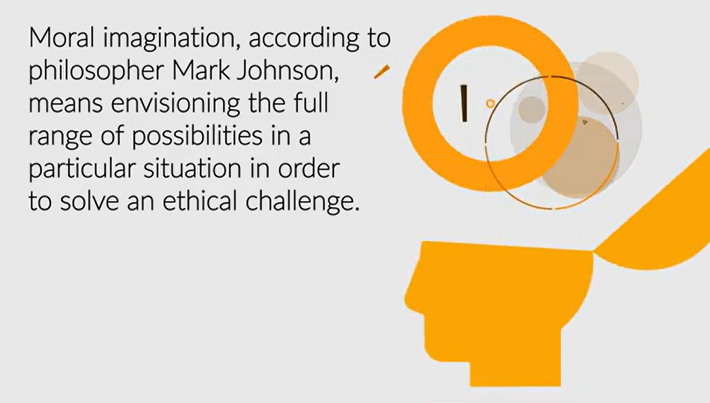Sustainability can be an impactful force for good. However, the word “sustainability” may hold different meanings for different people. When we think about sustainability at UT Austin, we may think of incorporating green building practices, recognizing the impact of our campus food system, powering our campus with an award-winning utility system, or even participating in research on climate change impacts on cities. Exploring sustainability in any of these systems and activities requires complex decisions and trade-offs.
As we reflect upon how we engage in sustainability practices, it’s important to consider the full range of possibilities that could solve an ethical challenge. This creative effort is known as “moral imagination.”
As you watch the 1.5 minute video, consider ways in which you already engage in sustainability practices and recognize how ethics helps guide the conversations.

Adopting a sustainability mindset may take time, creativity, and adjustments to current habits and ways of thinking. But we are all capable of making changes at work and at home by exercising our moral imagination. Consider the following:
- When buying a product or service, efficiency and durability can be considered. For example, can it be repaired or repurposed easily? Can it be recycled or composted? What are the ‘upstream’ environmental impacts of the product’s materials and the process of making it?
- Climate change is a top-of-mind topic for many and our choices today will have an impact on future generations. For example, consider your mode of transportation to and from work and whether there are more sustainable options available.
- Consider attending the Mitchell Sustainability Symposium or other events hosted by the Office of Sustainability. Connecting with others can help you discover ways to increase positive impacts and decrease negative impacts at work and at home.
Even small changes add up. In the long run, the impacts will be beneficial and will do more for the greater good.
We encourage personal learning about these topics and want to help you make them a regular part of your conversations. There are free classes in UTLearn, as well as additional videos about business ethics on LinkedIn Learning and through Ethics Unwrapped.
As members of the UT community, we are all expected to uphold our University’s core values through integrity, honesty, trust, fairness, and respect toward peers and community. If you are facing a dilemma, consider talking about it with a friend, a supervisor or manager, the Ombuds Office, your local HR representative, or consult with us at University Risk and Compliance Services. Others may be able to help you see something you are missing.
If you think someone is behaving unethically or illegally, contact the Compliance and Ethics Hotline online or by phone at 877-507-7321 (English) and 800-216-1288 (Español). Anonymous reporting is available. Remember that UT Austin prohibits retaliation against anyone who raises a concern in good faith.